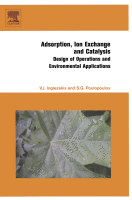Browse content
Table of contents
Actions for selected chapters
- Full text access
- Book chapterAbstract only
1 - Air and Water Pollution
Pages 1-30 - Book chapterAbstract only
2 - Adsorption, Ion Exchange, and Catalysis
Pages 31-56 - Book chapterAbstract only
3 - Heterogeneous Processes and Reactor Analysis
Pages 57-242 - Book chapterAbstract only
4 - Adsorption and Ion Exchange
Pages 243-353 - Book chapterAbstract only
5 - Catalysis
Pages 355-521 - Book chapterAbstract only
6 - Reactors Scale-up
Pages 523-550 - Book chapterNo access
Appendix I - Physical Properties of Water, Air and Selected Compounds
Pages 551-573 - Book chapterNo access
Appendix II - Conversion of Units
Pages 575-580 - Book chapterNo access
REFERENCES
Pages 581-593 - Book chapterNo access
Index
Pages 595-602
About the book
Description
Adsorption, Ion Exchange and Catalysis is essentially a mixture of environmental science and chemical reactor engineering. More specifically, three important heterogeneous processes, namely, adsorption, ion exchange and catalysis, are analysed, from fundamental kinetics to reactor design with emphasis on their environmental applications. In Chapter 1, the subject of air and water pollution is dealt with. Data about pollutants and emission sources are given and the treatment methods are shortly presented. In Chapter 2, the very basics and historical development of adsorption, ion exchange and catalysis are presented as well as their environmental applications. Chapter 3 is devoted to heterogeneous processes and reactor analysis. All types of reactors are described in depth and reactor modelling, hydraulics and mass/heat transfer phenomena are examined for each type of reactor. Chapters 4 and 5 are dedicated to adsorption & ion exchange and catalysis, respectively. The basic principles are presented including kinetics, equilibrium, mass/heat transfer phenomena as well as the analytical solutions of the reactor models presented in Chapter 3. In the sixth chapter, the subject of scale up is approached.
The two Annexes at the end of the book contain physical properties of substances of environmental interest as well as unit conversion tables. Finally, nearly all the examples contained are based on real experimental data found in literature with environmental interest. Most of the examples consider all aspects of operation design – kinetics, hydraulics and mass transfer.
Adsorption, Ion Exchange and Catalysis is essentially a mixture of environmental science and chemical reactor engineering. More specifically, three important heterogeneous processes, namely, adsorption, ion exchange and catalysis, are analysed, from fundamental kinetics to reactor design with emphasis on their environmental applications. In Chapter 1, the subject of air and water pollution is dealt with. Data about pollutants and emission sources are given and the treatment methods are shortly presented. In Chapter 2, the very basics and historical development of adsorption, ion exchange and catalysis are presented as well as their environmental applications. Chapter 3 is devoted to heterogeneous processes and reactor analysis. All types of reactors are described in depth and reactor modelling, hydraulics and mass/heat transfer phenomena are examined for each type of reactor. Chapters 4 and 5 are dedicated to adsorption & ion exchange and catalysis, respectively. The basic principles are presented including kinetics, equilibrium, mass/heat transfer phenomena as well as the analytical solutions of the reactor models presented in Chapter 3. In the sixth chapter, the subject of scale up is approached.
The two Annexes at the end of the book contain physical properties of substances of environmental interest as well as unit conversion tables. Finally, nearly all the examples contained are based on real experimental data found in literature with environmental interest. Most of the examples consider all aspects of operation design – kinetics, hydraulics and mass transfer.
Key Features
* Provides basic knowledge of major environmental problems and connects them to chemical engineering
* Provides basic knowledge of major environmental problems and connects them to chemical engineering
Details
ISBN
978-0-444-52783-7
Language
English
Published
2006
Copyright
Copyright © 2006 Elsevier B.V. All rights reserved
Imprint
Elsevier Science
